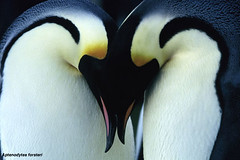Zrenneh on his post 'The March of the Penguins' discussed Rabbi Marc Gellman's article,'The March of the Loving Penguins'. In his article, Gellman debated the ability of penguins to love, and came to the conclusion that although penguins were able to exhibit animal lust and self-sacrifice, they could not actually fall in love. This post is an extension to Zrenneh's counter argument.
Rabbi Gellman's argument has one major flaw. In arguing that penguins cannot experience love, he fails to define the word 'love', hence making his claim impossible to support.
Love is clearly a very difficult concept to pin down to a single definition, but in order for language to be meaningful, a broad agreement on the meaning of the individual words needs to be reached. The Merriam Webster online dictionary gives many ,meanings for the word, but the primary definition of the verb 'to love' is:
1 a (1) : strong affection for another arising out of kinship or personal ties (maternal love for a child)
(2) : attraction based on sexual desire : affection and tenderness felt by lovers
(3) : affection based on admiration, benevolence, or common interests
In 'The March of the Penguins', the penguins demonstrate all three of these forms of love:
(1) Strong affection based on close personal ties: the mother for the child (evidenced by her selfless nurturing of it), the penguinfor its partner (evidenced by the penguins' cooperation and the personal depravation endured for one another's benefit).
(2) Attraction based on sexual desire: although we may argue that this is only instinctive animal lust, such instinctive animal lust accounts for a great many human sexual encounters and is a large part of the human, as well as the animal, genetic make-up.
(3) Affection based on common interests, i.e. that of looking after their child. The cooperation exhibited by the penguins could teach many modern parents the benefits of working towards a common goal in harmony rather than in conflict.
Rabbi Gellman's only attempt at justifying his rejection of the concept of penguin love is the following:
"Penguins don't plight their troth to one another for fish or no fish, for colder or really colder, for seas full of krill or seas full of leopard seals."What he appears to be suggesting here, is that love is not really love unless it is everlasting and able to surmount all obstacles. This is manifestly not the case, not only for penguins but also for humans. Literature has taught us that the greatest loves may only be temporary: Anna Karenina, Madame Bovary and Rhett Butler are proofs that it is just as easy to fall out of love as it is to fall in love. In addition, rising divorce rates in the Western world indicate just how many people declare their love to be everlasting, only to discover that it is not. Very few people suggest that this calls into question the validity of the emotion in the first place.
Perhaps Rabbi Gellman's real problem with the concept of penguins falling in love arises, not out of their lack of eternal committment to one another, but from their inability to love an abstract being, that is, God. As a Jew, Gellman focuses throughout his article on the unique ability of humankind to love. Perhaps it is this abstract, spiritual love which is lacking in penguins and leads Gellman to abandon altogether the notion of penguin love. Whatever Gellman's reasoning, it is clear that, although there are possibly several types of love which penguins probably do not experience, there are also many types (illustrated by the Merriam Webster definitions) which penguins do demonstrate. To say that 'The March of the Penguins' is a story about love is a fair summary. As Elizabeth Barrett Browning so neatly pointed out, there are many different ways to exhibit love, and the penguins on the icy wastelands of Antarctica certainly seem adept at exhibiting many of these.


1 comment:
I have to say that I found Gellman's article rather glib & ill thought out. Not only does he fail to define love, but he seems to regard emotion as a purely human characteristic, ascribing animals feelings to pure instinct appropriate to their species. Well, surely the same could be said of human emotions. This can be experienced first hand on the birth of a child. You may not have wanted a baby, but when you first see your own child, you are overwhelmed with an instinctive love that you cannot choose to avoid. You would do anything to protect your child - just as the penguins do.
He also does not define evil. He says it is wrong to ascribe evil intentions to a shark. Fair enough, the shark is instinctively seeking food. But what about a gorilla, who will deliberately kill a gorilla from another tribe. Is this not malice - or evil - of the same kind as human racism. Is it not part of the same Darwinian survival of the fittest instinct? It seems to me that the main difference between human & animal emotions is our ability to describe them. But an elephant, or even a dog, grieves for a lost child or master in a way that is undeniably emotional. The love my brother Nic has for his dog is very similar to the love the dog has for him. They just express it differently. (How your father fits into this emotional spectrum I'm not sure!)
Post a Comment